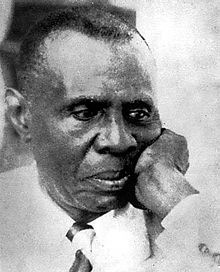Jean Price-Mars
| Jean Price-Mars | |
|---|---|
 |
|
| Minister for Foreign Affairs and Worship | |
|
In office 14 December 1956 – 9 February 1957 |
|
| President | Joseph Nemours Pierre-Louis |
| Preceded by | Joseph D. Charles |
| Succeeded by | Evremont Carrié |
| Minister for Foreign Affairs, Worship and Education | |
|
In office 19 August 1946 – 10 April 1947 |
|
| President | Dumarsais Estimé |
| Preceded by |
Antoine Levelt (Foreign Affairs and Worship) Daniel Fignolé (Education) |
| Succeeded by |
Edmée Manigat (Foreign Affairs and Worship) Emile Saint-Lot (Education) |
| Personal details | |
| Born |
October 15, 1876 Grande-Rivière-du-Nord |
| Died | March 1, 1969 (aged 92) Pétion-Ville |
Jean Price-Mars (15 October 1876 – 1 March 1969), born in Grande Rivière du Nord, was a Haitian teacher, diplomat, writer, and ethnographer. Price-Mars served as secretary of the Haitian legation in Washington (1909) and as chargé d'affaires in Paris (1915–1917), during the initial years of the United States occupation of Haiti.
In 1922 Price-Mars completed medical studies which he had given up for lack of a scholarship. After withdrawing as a candidate for the presidency of Haiti in favor of Stenio Vincent in 1930, Price-Mars led Senate opposition to the new president; he was forced out of politics. In 1941, Price-Mars was again elected to the Senate. He was secretary of state for external relations in 1946 and, later, ambassador to the Dominican Republic. In his eighties, he continued service as Haitian ambassador at the United Nations and ambassador to France.
Price-Mars championed the Negritude movement in Haiti through his writing, which "discovered" and embraced the African roots of Haitian society. Price-Mars was the first prominent defender of vodou as a full religion complete with "deities, a priesthood, a theology, and morality." He argued against the prevailing prejudice and ideology which favored European cultures from the colonial period and rejected non-white, non-Western, elements of the cultures of the Americas. His Haitian nationalism embraced a cultural identity as African through slavery, in contrast to the neighbouring Dominican Republic, which prided itself as affiliated with Spanish culture. Historically the latter country had a much lower proportion of slaves in its population and had a different colonial history than did Haiti.
Price-Mars' attitude was inspired by the active resistance by Haitian peasants to the 1915 through 1934 United States occupation. He deplored the elite's abandonment of the tradition that had emphasized the nation's achieving independence from French colonialism, but he took pride in the conduct of the poor. He attacked the elite for their "inability to promote the welfare of the Haitian masses."
...
Wikipedia
